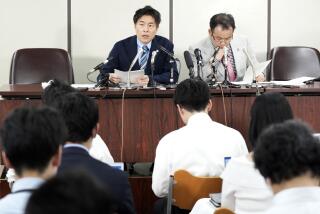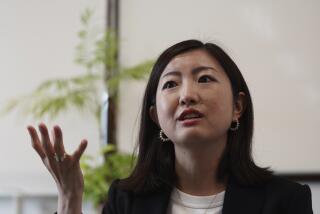Japanese Voters Outraged Over Tax on Goods
- Share via
TOKYO — Voters in Tokyo, particularly women, have confirmed what Takeo Tanaka has been hearing at his children’s apparel shop for the past three months.
“This makes your stomach stand up and growl, doesn’t it?” is the usual remark Tanaka says he hears from angry homemakers when he adds a new 3% consumption tax to the retail price of goods in his store in the Kameari section of Tokyo.
Shoppers buying food in supermarkets, women paying the tax on doctor’s fees for childbirth or abortion services and parents bearing heavier expenses for their children’s education since the new levy was implemented April 1--all are expressing the same dissatisfaction.
At the same time that ordinary Japanese feel their daily expenses rising, they have seen revelations that their politicians are fattening their own pocketbooks, often with windfall tax-exempt stock profits, as in the Recruit Co. influence-buying scandal. What was seen by many as yet another example of high living by a politician--Prime Minister Sosuke Uno’s purchase of the services of a geisha four years ago--generated even more anger against the ruling Liberal Democratic Party.
Explosive Resentment
Indeed, resentment against the conservatives who have ruled Japan since 1955 has reached a scale seldom seen.
It exploded in Tokyo on Sunday as voters slashed the ruling party’s holdings in the Tokyo Metropolitan Assembly, the prefecture’s legislative body, leaving it with barely one-third of the 128 seats. The voter turnout was 5% greater among women than men, and 17 of 33 women candidates were elected.
Political experts, who said before the election that women were the most enraged by the consumption tax, expect a similar result in urban areas when a crucial election is held for the upper house of Parliament July 23.
Even before allegations of Uno’s extramarital affairs emerged two days after he took office, local governments, with the support of local Liberal Democrats, had rebelled against the consumption tax. Fearing the voters’ wrath, 24 of 47 prefectural (state) governments refused to add the 3% tax to public utilities and other fees related to daily necessities.
Wisdom Questioned
Resentment of the tax continues to grow. As a reform package containing the consumption tax was being debated in Parliament last fall, opinion polls found 65% of voters opposed to it. After the Liberal Democrats steamrollered it into law, 82% expressed unhappiness. And now that it has been implemented, 95% declare discontent, with 65% demanding repeal.
“Almost no one supports it,” conceded Takashi Kon of the Liberal Democrats’ headquarters election measures committee. Even the ruling party is “unhappy with the Finance Ministry,” he said before the Tokyo election, adding: “Finance Ministry bureaucrats just said, ‘We’ll use it (revenue from the tax) wisely.’ Without knowing how it will be used, how can the people believe it will be used wisely?”
Shigeru Aoki, a member of Parliament who heads the tiny New Salaryman’s Party, said that taxpayers “see no clear purpose for the tax. If they did, they wouldn’t resent it so much.”
“Voter sentiment right now is ‘Let’s cauterize them!’ ” Kon said of his own party’s public standing before the Tokyo vote.
Consumers have focused their wrath on a set of new inequities, irrationalities and idiosyncrasies created by the consumption tax, Japan’s first.
Although the Finance Ministry had argued that the reforms would restore fairness and balance to Japan’s tax system, the ministry’s own employees’ restaurant wound up increasing the price of coffee but retaining the old price of tea. Coffee drinkers pay more than 3% extra to subsidize tea drinkers, who pay no tax at all.
Similarly, longer-distance subway riders are now paying up to 14% extra, while short-distance riders still pay the old fares, with no tax added.
Lightweight Coins
Such anomalies occurred as part of desperate attempts to avoid dealing in change involving 1-yen coins. Hardly anyone carries the coins, and they don’t work in vending machines. The coins, made of aluminum and so light they float on water, are worth only seven-tenths of a penny.
Moreover, the uniform tax rate is hitting hardest those who can least afford it. More than 8.3 million pensioners, many of whom live on monthly allowances of only $930, for example, now have to pay more for food and rent.
Government authorities have been trying to win acceptance of the consumption tax by pointing out that excise taxes were abolished as part of the reform package.
“But housewives resent seeing diamonds and cars getting cheaper while daily necessities get more expensive,” Tanaka said.
Other shopkeepers also are upset. Although Tanaka said he must pay the consumption tax to his wholesalers as soon as he receives his goods, the wholesalers can earn interest on the tax collections for half a year before they have to pay them to the tax office.
“The bigger you are, the more you benefit,” Tanaka complained. “Both customers and we shopkeepers feel the tax reforms benefit only the rich.”
Reductions in corporate taxes, too, contrast with cuts in individual income taxes.
Corporate Advantage?
The Communist Party calculated that Japan’s top 50 corporations would enjoy one-year tax cuts amounting to $2.4 billion. But in a mid-April opinion poll, 71% of taxpayers said that, contrary to government claims, they did not feel their overall tax bill had been cut despite the reduction in income taxes.
The interest payments and capital gains of individual stockholders have lost tax-exempt status. But such unearned income is still taxed separately from earned income--and at a low rate of 20%, Aoki pointed out.
“No tax system in the world is as unfair to the salary earner as Japan’s,” he charged.
About 180,000 religious organizations retain tax-exempt status, Aoki complained. But at the same time, he said, deductions permitted to salaried employees, whose taxes are taken out of wages, remain woefully inadequate.
Some of the negative reaction appears to be occurring simply because the Japanese have never experienced a sales or consumption tax before. The old excise taxes were hidden in prices, and consumers never knew how much they were paying.
“Nobody ever protested the tax on beer (which is more than half the price) because it is included in the price on the bottle,” Tanaka noted. “But when customers bring an item to the cash register and are asked to pay more than the price tag, they get mad.”
Confused Consumers
Some shops have included the tax in their prices. Others have not. As a result, consumers often are confused as to how much tax they are paying, or even whether they are paying the tax. And when they do pay, Aoki added, they are not sure their money finds its way to the national treasury.
Medium-size enterprises, with annual sales of $214,300 (30 million yen) to $357,100 (50 million yen), are only required to report their own sales invoices to tax authorities. With tax evasion known to be widespread among both wholesalers and retailers, how much of the tax that they collect from consumers actually goes into their own pockets is anyone’s guess.
Tanaka’s children’s apparel shop, like others with less than $214,300, or 30 million yen, a year in sales, is exempt from the tax. But the exemption only means that his store is not required to take tax collections to tax authorities.
“We still have to pay the tax--on everything we buy from wholesalers,” he said.
Yet small shopkeepers also pocket a rake-off. The 3% tax Tanaka charges retail customers after his mark-up is the equivalent of only 2.4% of the extra amount he pays wholesalers. The difference, or 0.6% of the retail price, “I keep,” Tanaka said.
But he says the extra profit is not worth the extra trouble he has to go through because of the tax.
More to Read
Sign up for Essential California
The most important California stories and recommendations in your inbox every morning.
You may occasionally receive promotional content from the Los Angeles Times.













